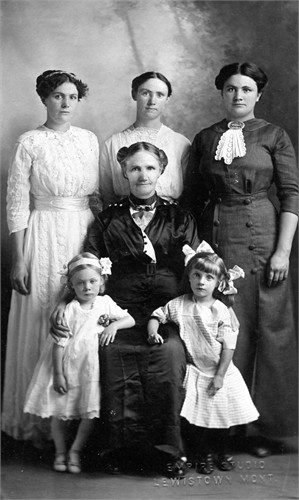When we last left off with the story of Lizzie an accident had just occurred.
On the family's return trip from Billings, Montana the older children were walking along the roadside picking flowers. Five year old Electra who was riding in the wagon decided she wanted to pick flowers too and while climbing down, slipped and fell. Her dress caught in the brake block and threw her under the wagon. The heavy wagon rolled over her body and her back was broken. The family went back to Billings for a doctor, but he said he could do nothing for her. Her father, Rollins Don Carlos, wanted to get back to the ranch, so they made a bed for her in the wagon and started out. Their travels took them through the Crow Reservation at Pryor, Montana. The Crow tribe did what they could to ease her suffering, but after a few days she died on June 27, 1894. She was laid to rest there on the reservation with a service spoken by a Catholic priest. Lizzie did not feel good about the rosary beads and the cross he put into her little coffin and she removed those before she was buried.
The family finally returned to Burlington in the month of July. Young Earnest, who at twelve years old, had been left behind to mind the ranch, had almost given up hope of ever seeing them again. The sad events of the trip and the poor conditions of the family made it hard for them to accomplish much that summer. Lizzie's husband, Rollins Don Carlos, continued to work for other others. They moved onto the Thorn Ranch and lived in a small cabin. It was another hard winter for them. In the Spring of 1895, Rollins Don Carlos chose his land and began to clear some of the sagebrush. While they were still living at Thorn's Place another daughter was born. Valie Shepherd joined the family on June 5, 1895. (Valie in later years would share how her father wanted to name her Roxalana Ray after his mother, but what of the neighbors had a dog named Roxie, and that is why she was not given that name.)
In 1895 Mormon settlers located in the region permanently and named the place Burlington. They decided to build another ditch to cover the land lying along the river valley and it could be down for much less than the Bench Canal. Things were looking blue, but the settlers came together and elected Richard L. Proctor as Superintendent and through his untiring effort rallied the people. That land had to be homesteaded so that every man had to build on the place he had selected for a home. The ditch was sufficiently finished and some crops were raised the same season that the work began. The group of families that were among those who built homesteads included the Shepherds, Packards, Bakers, Rigtrup, Corns and Dobson families.
Young Earnest and Carl hauled logs from the Narby mountains and a one room cabin was built. A story by Claude states that they moved to the homestead in the Fall of 1895. They hauled logs to build a fence so cattle could be kept out. The first year they put in five acres of hay and grain. They continued to clear more land each season. The following years they had a good crop of wheat and Lizzie had a large bin built in one corner of the cabin. She filled it with wheat and a bed was made over it. She traded three bushels of wheat for a small pig. The pig had the scurvy and she put it into a wash tub and gave it a good lye soap bath and then fed it well. She was rewarded with a nice littler of pigs the following spring. Claude's story tells of pulling salt grass during the winter to feed the pigs.
The family continued to clear the land. The earliest memory that Valie recounted was of sitting on a blanket of sagebrush while the older boys, Earnest and Carl, hauled more logs from the mountains. Times were still very hard for the settlers, but romance entered the picture too when eldest daughter Florence Wiggett, at age seventeen married Burton Jackson Prettyman on August 3, 1896.
The young couple went to live with his family at their place across the Greybull River. They built a small house on his parents property and lived there for about ten years. Burton Prettyman had been married before and had one son, Charles Prettyman.
The Shepherd family was able to get a cow and some chickens the next year. This added milk, butter and eggs to their diet. The children picked berries down along the Greybull River in the summer for fruit. Sometime during the year of 1897 Lizzie suffered a late term miscarriage. That same year she also became a grandmother. Lizzie was thirty-six years old the year her daughter, Florence Wigget Prettyman had her first child on May 12, 1897, a son named Josephus Prettyman.
To be continued....


No comments:
Post a Comment